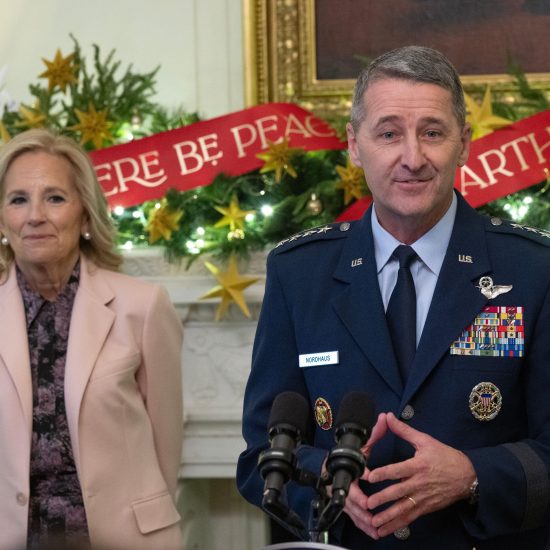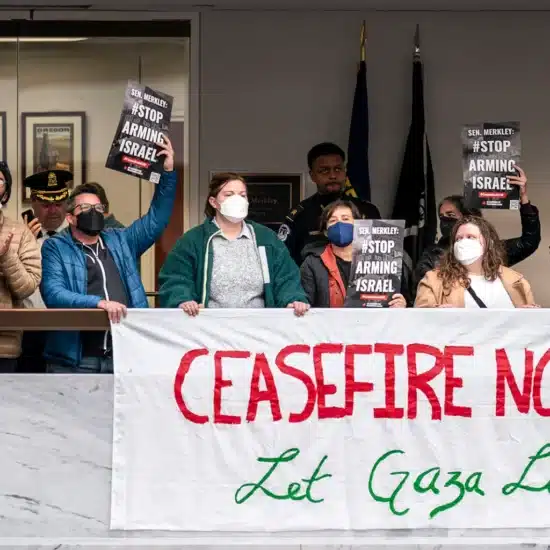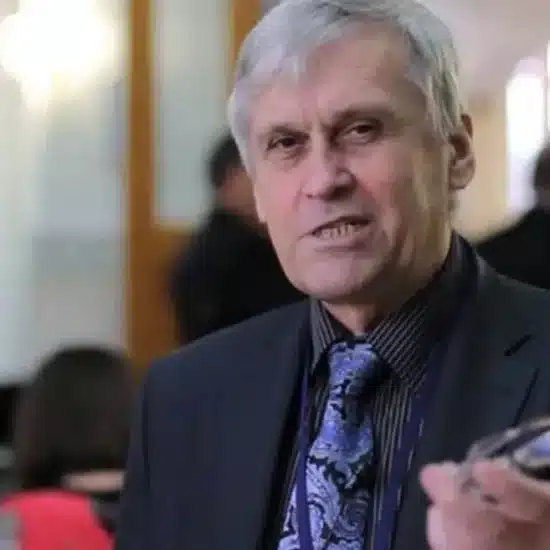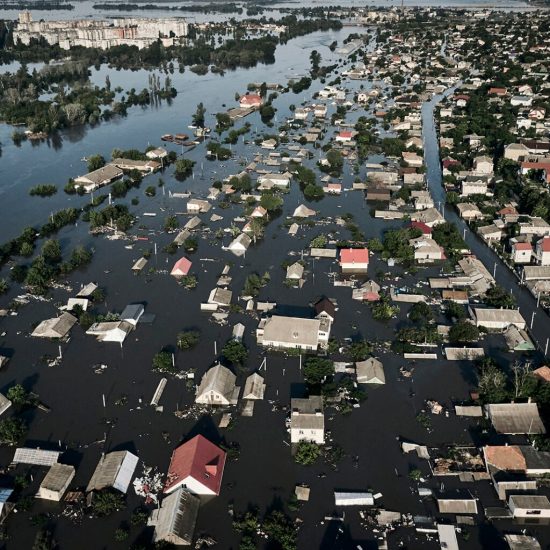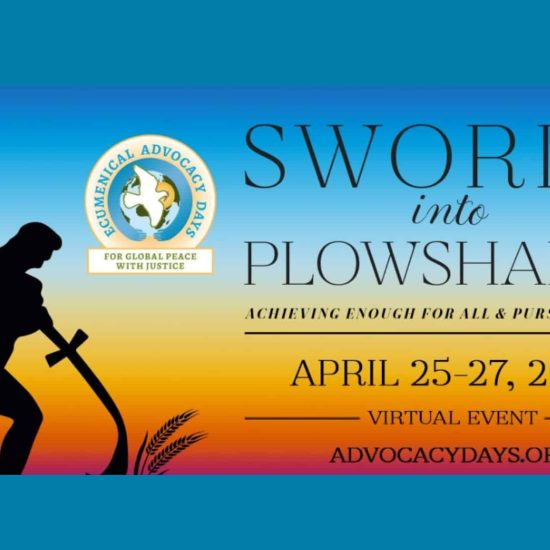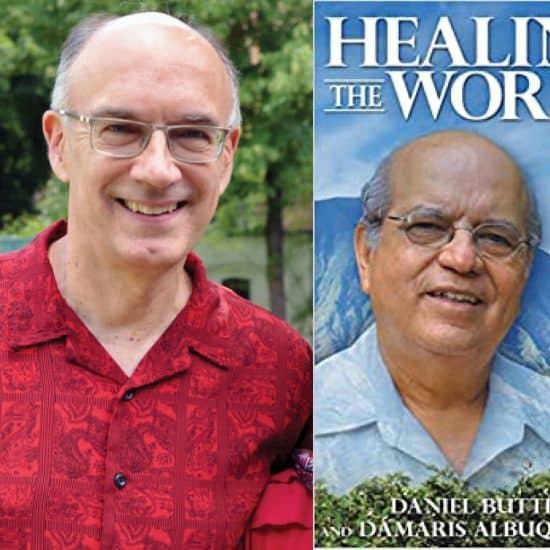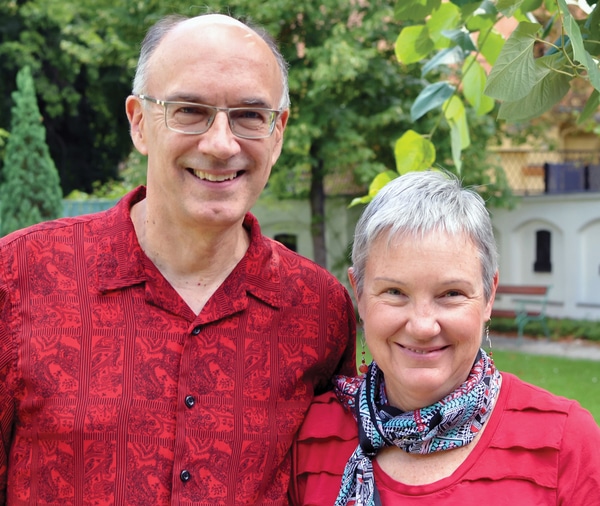
Dan and Sharon Buttry, global consultants for American Baptist Churches USA’s International Ministries, recently led a ten-day training for conflict transformation trainers as the first major initiative of the new Buttry Center for Peace & Nonviolence at Central Baptist Theological Seminary in Shawnee, Kan. Word&Way Editor Brian Kaylor interviewed the Buttrys at CBTS shortly before the training conference.
You have both served as global consultants for International Ministries, which is the foreign missions arm of American Baptist Churches USA. Dan, you serve as a global consultant for peace and justice, and Sharon, you serve as a global consultant for community transformation. So, I wonder if you could talk about what roles? What have you been doing in these particular positions?
 Dan and Sharon ButtryDan: Most of our missionaries are traditional missionaries based in a particular country, but some of our missionaries were being asked by people from other contexts to share their expertise. And so the idea developed in response to have these global missionaries who would be based in a discipline, but work around the world. I had been doing peacemaking work in various capacities, for a long time. I was a pastor in Dearborn, Mich., but working quarter-time with the Baptist Peace Fellowship involved in some projects, especially in Northeast India and Burma, two historic major mission fields, but both of which had been scenes of great conflict, war.
Dan and Sharon ButtryDan: Most of our missionaries are traditional missionaries based in a particular country, but some of our missionaries were being asked by people from other contexts to share their expertise. And so the idea developed in response to have these global missionaries who would be based in a discipline, but work around the world. I had been doing peacemaking work in various capacities, for a long time. I was a pastor in Dearborn, Mich., but working quarter-time with the Baptist Peace Fellowship involved in some projects, especially in Northeast India and Burma, two historic major mission fields, but both of which had been scenes of great conflict, war.
The missionaries from both of those areas had been expelled because of the conflicts but we got engaged in conflict transformation work and the folks in those contexts were telling International Ministries, “This is what we need.” And so they came together — both the global design, but also the peacemaking concern. [It was] also a time in my life where I was ready to make that transition, so that’s how I ended up coming along.
Sharon: My training is in social work. I have a master’s degree in macro social work, which is community development and facilitation of groups. So, I got involved with Dan by going with him on my vacations. I had the training on how to do facilitation using elicitive questions and a very participatory model of education. I got Dan interested in that while I was in graduate school, and we both got our training from an organization called Training for Change in Philadelphia.
It was very easy for me to go along with Dan and co-facilitate or co-train. I love peacemaking. I have a passion for that as well. But my real heartbeat is community development, community transformation, the same skill set as far as leading groups and bringing people to places where they can do their own contextual assessments and design interventions. That’s very social work language.
So, while Dan’s been doing a lot of traveling and working globally, I’ve been practicing and doing ministry in a very local context in Detroit in a neighborhood that’s an immigrant enclave. I bring a lot of that experience and stories and passion for community transformation to the work we’re doing.
So why should Christians work towards peace between peoples and even nations? Why is this part of our call?
Dan: To me it goes right back to the Gospel itself. God in Christ was reconciling the world to himself and giving to us the ministry of reconciliation (2 Corinthians). I think that many times we have lost that second part of that. We kind of make it individual, me and Jesus, and even in some of the church planting it’s kind of like, let’s have homogeneous churches.
We lived in Boston, the border between predominantly African- American and predominantly Irish- American communities, and there was a lot of violence, interracial violence. We had a lot of other ethnic groups on that border and we ended up with a multicultural church, which, in that context, showed the power of the Gospel to the number one sociological challenge that people were grappling with.
If we have a gospel that doesn’t speak in a living, dynamic way to the kinds of things that people live with and that destroy our societies, then, what’s the Good News? How do we live it out?
I think that part of it is because we have we found ways to compromise the gospel or wed it to other interests, whether it’s nationality, race, our tribe. Of course Paul says there’s no Jew or Greek, no male or female, no slave or free. We’re all one in Christ. So how do we live that out? I think of Jesus coming into Jerusalem, and he wept. Do you know why he wept? It’s right there in the scripture. He wept saying, if you only knew the things that make for peace, but they’re hidden from your eyes.
Our training is basically to give the things that make the peace to people to put into practice in their context. So I like to think of it as we’re wiping away the tears of Jesus.
Sharon: As a Christian. I have a very personal relationship with Jesus. And so I often meditate on how he gave his life so that we could be reconciled to our Heavenly Father, to God. To me it’s the example of Christ that leads me into peacemaking. My own personal journey has brought me through a lot of difficult family dynamics, and exercising forgiveness in my family. It’s a matter of obedience. If you think about all the fruits of the Holy Spirit, none of them can really happen when you’re in serious conflict unless you exercise obedience to the reconciling power of Christ.
So I found in my own life that my sense of love, joy, peace, patience, kindness, goodness, faithfulness, gentleness, self-control have been strongly developed through conflict and, wouldn’t it be amazing if everyone in the world had the benefit of the power of God at work in us, and in our families, our communities, in the nation.
One of the things I love to do is developing youth in my community, teaching them leadership skills, helping them discover grace and just the power of the Gospel to heal, personally, but also among us.
We’re sitting here on the campus of Central Baptist Theological Seminary because earlier this year Central launched The Buttry Center for Peace and Non- Violence. What is that Center and what’s your vision for this work?
Sharon: The vision really came, through [Associate Professor of Pastoral Theology] Ruth Rosell, I believe, and in Myanmar where we’ve done a lot of peacemaking work. The Myanmar Institute of Theology has a Peace Center and as cohort groups have come from Central to Myanmar and there been many exchanges. I think that the idea and the vision for a Peace Center here, to be a sister or match for what is happening in Myanmar was part of the vision. In that country they do huge amounts of training.
In fact, one of their trainers is a graduate of our 10-day training and he is going to co-facilitate with us here at Central. We chose him because of the relationship between Myanmar and Central so that he would be able to give back and see what’s happening here and strengthen that relationship. So I think the vision for the center is a very awesome vision. It’s a global vision, how to increase the number of people who have the confidence in Christ to become conflict transformation leaders.
Dan: We have no previous connection to Central in terms of being students. Central gave me an honorary doctorate back in 2009 and then we ended up being adjunct faculty on a cohort that went to Myanmar and Thailand and so we got to know them, work together. And then we worked with a student of Central, Wilson Gathungu, who was originally from Kenya, and he went back to Kenya to do peacemaking work sparked by [Professor of Pastoral Theology] Terry Rosell, his professor of social ethics.
He’d written a paper about the violence in Kenya and a church response. And Terry said, this shouldn’t be a paper, it should be a project. So Wilson left, went back to Kenya, developed an amazing peacemaking work there. It’s one of the flashpoints in the country, and the Rosell family and Sharon and I went to Kenya and worked with him. And then later we did the 10-day training in Kenya and Wilson was our local coordinator. These things kind of wove us together. They also got to see us in action, but also mentoring some of their students.
It’s named after the two of us because I’ve tended to do more of the global work. Sharon’s been very involved in intense work in the local community in Detroit, a lot of anti-violence work, a lot of public safety work, and we help each other and kind of overlap. You know, some people say, think globally, act locally. Well, I think you need to think both and act both.
That’s part of the vision here, and why both of us are caught up in the naming of it. We envision that what happens in Kansas City will be impacted as well as the global thing. We’re having the training here, we’re having a lot of local people from Kansas City as well as some international participants. We see that as a vital.
All of our peacemaking has to be where we live and it’s kind of multifronts, whether it’s an urban area or dealing with international conflicts or something that is happening across the world.
Note: A longer version of this conversation can be heard in episode 26 (Sept. 4) of the weekly Word&Way podcast “Baptist Without An Adjective.”
Additionally, another interview conducted during the conflict transformation training conference can be heard in episode 27 (Sept. 11). That episode will feature Mariam Tadros, peacebuilding programme coordinator for Tearfund in the United Kingdom.
Find the show at tinyurl.com/BWAApodcast or search for its title in iTunes.
Learn more about the Buttry Center for Peace & Nonviolence at cbts.edu/buttry-centerpeace- nonviolence. Find resources on peace and nonviolence from Dan Buttry at danbuttry.com.

